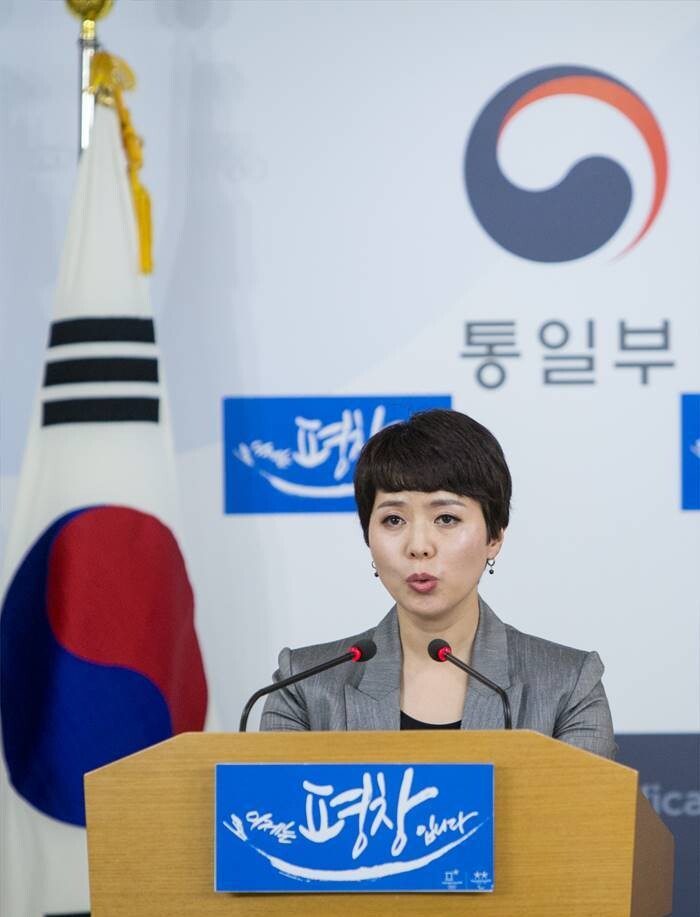hankyoreh
Links to other country sites 다른 나라 사이트 링크
With private group’s approval, inter-Korean exchange being resumed

Private exchange between South and North Korea is finally resuming after long being strictly prohibited.
The South Korean government announced on May 26 that it had approved a request to contact North Korean residents by the humanitarian aid group Korean Sharing Movement (KSM). It was the first approval for contact with North Korea granted to a private South Korean group since the North’s fourth nuclear test in Jan. 2016.
“The government’s position is one of responding sternly to North Korea’s provocations while considering humanitarian aid and other forms of private interchange on a flexible basis, to the extent that it does not compromise the framework of international sanctions against the North,” explained Ministry of Unification deputy spokesperson Lee Yu-jin in a May 26 briefing.
“It is from this perspective that it has approved the private group Korea Sharing Movement’s request to contact North Korean residents for the purpose of humanitarian discussions to control malaria at the border region,” she added.
Lee went on to say that “future requests received for visits and carrying of goods to North Korea will be a separate issue from approvals for contact,” adding that they would “need to be reviewed in light of a range of factors, including the number of visitors, details of items carried, condition of inter-Korean relations, and physical safety.”
Around 20 groups besides KSM are reported to have submitted requests to the ministry for contact with North Korea since President Moon Jae-in took office, including Okedongmu, a group providing health, nutrition, and educational support for North Korean children.
The same day, the Ministry of Unification reported on a number of issues to Moon’s governance planning advisory committee, including expanded private interchange and other improvements to inter-Korean relations, reunions for divided families and other humanitarian issues, and solutions to the North Korean nuclear and missile programs. The ministry’s operational report was reportedly focused on the “new Korean Peninsula economy map” initiative, one of Moon’s key pledges as a presidential candidate.
The initiative, announced by Moon as leader of the New Politics Alliance for Democracy (precursor to today’s Minjoo Party) in Aug. 2015, includes an expanded economic zone reaching North Korea and mainland Asia; proposals for 2+2 meetings with North Korea and the US to resume the Six-Party Talks on the north Korean nuclear issue; the lifting of the May 24 Measures, economic sanctions imposed in response to the Cheonan warship sinking; and resumption of tourism at Mt. Keumgang.
By Jung In-hwan, staff reporter
Please direct questions or comments to [english@hani.co.kr]

Editorial・opinion
![[Column] Has Korea, too, crossed the Rubicon on China? [Column] Has Korea, too, crossed the Rubicon on China?](https://flexible.img.hani.co.kr/flexible/normal/500/300/imgdb/original/2024/0419/9317135153409185.jpg) [Column] Has Korea, too, crossed the Rubicon on China?
[Column] Has Korea, too, crossed the Rubicon on China?![[Correspondent’s column] In Japan’s alliance with US, echoes of its past alliances with UK [Correspondent’s column] In Japan’s alliance with US, echoes of its past alliances with UK](https://flexible.img.hani.co.kr/flexible/normal/500/300/imgdb/original/2024/0419/2317135166563519.jpg) [Correspondent’s column] In Japan’s alliance with US, echoes of its past alliances with UK
[Correspondent’s column] In Japan’s alliance with US, echoes of its past alliances with UK- [Editorial] Does Yoon think the Korean public is wrong?
- [Editorial] As it bolsters its alliance with US, Japan must be accountable for past
- [Guest essay] Amending the Constitution is Yoon’s key to leaving office in public’s good graces
- [Editorial] 10 years on, lessons of Sewol tragedy must never be forgotten
- [Column] A death blow to Korea’s prosecutor politics
- [Correspondent’s column] The US and the end of Japanese pacifism
- [Guest essay] How Korea turned its trainee doctors into monsters
- [Guest essay] As someone who helped forge Seoul-Moscow ties, their status today troubles me
Most viewed articles
- 1[Column] The clock is ticking for Korea’s first lady
- 2After 2 months of delayed, denied medical care, Koreans worry worst may be yet to come
- 3[Column] Has Korea, too, crossed the Rubicon on China?
- 4US overtakes China as Korea’s top export market, prompting trade sanction jitters
- 5[Editorial] When the choice is kids or career, Korea will never overcome birth rate woes
- 6[Correspondent’s column] In Japan’s alliance with US, echoes of its past alliances with UK
- 7[Photo] Smile ambassador, you’re on camera
- 8Hong Se-hwa, voice for tolerance whose memoir of exile touched a chord, dies at 76
- 9Nearly 1 in 5 N. Korean defectors say they regret coming to S. Korea
- 10Strong dollar isn’t all that’s pushing won exchange rate into to 1,400 range